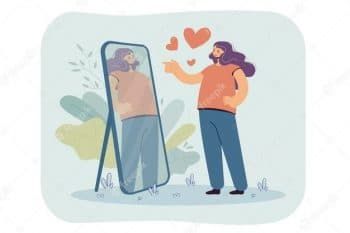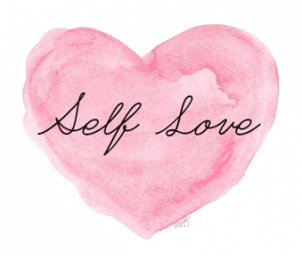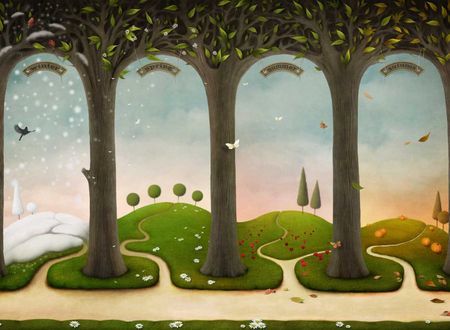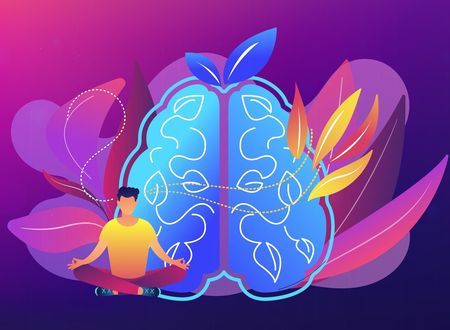Once upon a time, a thief hadn’t had any luck for many days in a row. One night he went out with the resolve that he wouldn’t return home empty-handed. He scoured the streets looking for the right home, the right opportunity, but without any success. Tired and dejected, in the wee hours of the morning, he sat on a footpath and fell asleep.
A few minutes later a drunkard was passing by. He saw the thief and felt sorry for him thinking he was also some drunk who had passed out on the street. He stopped by to see if there were any bottles lying nearby because that’s what he was interested in — more liquor. But, there were none. Feeling angry, he left. Hardly had he gone when another man, who happened to be a gambler, saw the thief.
“Poor loser,” he thought. “He must have lost so much that he’s scared to go home.”
An hour passed and another thief happened to pass this way. He looked at the sleeping man and thought, “He must be an unfortunate small-time burglar like me who couldn’t get his hands on anything tonight.”
Dawn was breaking over the horizon when a yogi was going to a nearby river for ablutions. He looked at the thief and began admiring him.
“This is a real yogi,” he thought. “Unlike me, who’s still caught up in rituals, he’s just lying here carefree, without any belongings. This is the way of a yogi.”
He derives deep inspiration from the thief, bows before him and gets going.
Another hour later, the sun, now warm and bright, wakes up the thief and he leaves for his home. Empty-handed.
This is how our world operates. It doesn’t matter who, how or what you are (or aren’t), each one will see you according to their capacity. They will form their opinion based on their own perceptions and preconceived notions about you. Some will think you are a thief while others will label you a gambler. Some may mistake you for a drunk and some may see you as a yogi. Often, most of what they think about you is dependent on them, their own conditioning. It is not as much about you as it is about them. The more you realize this, the less bothered you will be by their opinions.
I once read a quote: “You’ll worry less about what people think about you when you realize how seldom they do.” And, even when people do think about you, often it is more along the lines of what they want to think about you. As they grow and evolve, as their priorities change, they begin to think differently. They may or may not admit that their opinions about you have changed because our world expects consistency in everything. A change in opinion is not always taken so kindly. But regardless of whether they express it or not, as their own consciousness expands, they’ll see you in a new light. There is, therefore, little wisdom in chasing the ever-elusive thoughts of others.
I am not suggesting that you should lead a debauched life completely disregarding others, thinking, well, their opinions about you are wrong, but, I’m stating that sooner rather than later, it is a question you must ask yourself. How much are you willing to stretch yourself to gain others’ positive opinions of you? How important is it to you that others think highly of you? Quite interestingly, though not surprisingly, almost all of us want to be in the good books of others. We want others to think highly of us. There’s a certain sense of fulfillment and accomplishment when others approve of your own opinion about yourself.
The funny thing is they too are working hard so you may see them and think of them a certain way. Both want to create an impact on the other person to ultimately accomplish the same outcome: feel good about oneself. This urge for the approval of others is one of the strongest urges, it’s almost innate. Because since childhood, we are constantly seeking this approval.
Someone else is always marking us against the criteria they’ve set. We are always trying to match it. In doing so, we are eternally manipulating ourselves. This leads to great inner unrest and turmoil. One of the definitive ways to rise above other people’s opinions is to turn inward. And, how exactly to turn inward, you may wonder?
If you are honest with yourself, if you are leading a meaningful life, if you take a pause and reflect on your life and your actions, you’ll automatically begin to turn inward. Countless virtues will bloom in your heart like flowers do in spring. An inward mind leads to contentment.
What others have to say about you will bother you less and less then. Turning inward doesn’t mean that we become so selfish that we are only focused on ourselves. On the contrary, it means seeing ourselves as an extension of the universe. It is feeling the interconnectedness in everything there is. And, with this experiential understanding dawns the wisdom that you are complete, that you are a universe in your own right. And that, in your universe there’s plenty of space for everyone and their views.
If, based on your actions, you see yourself a certain way and believe that with the utmost conviction, the world will start seeing you that way too (if at all that matters to you). Because, everything is interconnected and interdependent. Absolutely everything. Whether you choose to be the sun, a moon, or just any star in your own galaxy, it’s your personal choice. The greater your magnitude, the less affected you are by the smaller stars. How you see yourself matters a great deal more than how others see you because your happiness and peace are dependent on your own honest view of yourself.
And, by the way, in the end, it doesn’t matter whether one is seen as a thief or a yogi, both will go empty-handed eventually. Everyone does.
Peace.
Swami
P.S. Many readers wrote to me requesting another meditation retreat in the near future. I’m pleased to announce one from Jul 3 – 7, 2015. Go here for more details. Only 75 0 spots left. Booked out.
Editorial Note
The more tied you are to how the world perceives you, the more self-loathing and sadness you will experience when the world views you negatively. The post above explains that when you are only bothered by how you perceive yourself, you experience contentment.
The questions below go deeper into self-acceptance:
Where does self-loathing stem from?
This is the anatomy of hate in a nutshell: we hate what we can’t stand (or understand).

Sadly, somewhere, each one of us has a trace of hatred in us. This could be self-loathing or hate for others but it’s the hard truth. After all, hate is nothing but an intense feeling. As long as we have insecurities or fears (which almost everyone does), we are likely to have jealousy and hatred too.
The sad part is that hatred is something that we are taught. No one is born with it, it is not innate. When we have hatred in our hearts, it means that some person, ideology or incident has taught us how to hate. Which, subsequently and thankfully, also implies that it’s something we can unlearn.
Continue reading about hate and its flip side, love.
Can hatred of others be a projection of self-loathing?
If you do not engage in what gives you joy, gives you happiness, your inner peace and bliss will evaporate. You will keep feeling something is missing without knowing what, you will feel angrier with others, with yourself, with the world, you will find yourself getting irritated quickly, you will wonder why you are not as patient as before. If you are experiencing these things, I can say with much conviction, you are not taking care of yourself. And what is self-loathing if not neglecting yourself and what you deserve?
Continue reading about taking care of yourself so that the world begins to experience you differently and vice-versa.
Does social media cause self-loathing and depression?

The ultra-connectedness of social media is highly addictive, damaging and detrimental to your mental and emotional well-being. On social media, everyone else seems happier than you. And you and I both know that nothing could be further from truth. We are fast creating a world that will increasingly lead to depression, anxiety and sadness. The worst part is that the e-world feels so real.
You may be passionate about updating your status on Facebook and checking up on your friends. You may feel a tiny surge of joy to share pics and jokes on WhatsApp and so on. But this simply means that you’ve got your mind used to the illusory pleasures of the digital world. Your mind may be constantly feeling good or longing for “likes” and “comments” when in essence they don’t add any value whatsoever to your real life. These likes, comments, conversations and chats don’t make us better people. They take us down a path of self-loathing and constant comparison.
Continue reading about these weapons of mass distraction and how to overcome them.
Why can love turn into hate so quickly?
People do not love you or hate you. It is not actually about you. It is not “who” they love, it is “what” they love, it is not “who” they want, it is “what” they want. They are not after you, they are after what you have in you.
When you are no longer able to offer what they want or when they no more want what you have, their love starts to fade away. This is why people can grow out of relationships.
When someone hates you, just know that they only hate what they do not understand about you. It is the same with how you view yourself. What is self-loathing? The aspects of yourself you despise because you have not yet turned inward to understand yourself.
Continue reading about why people love or hate you.
How do I stop my constant self-loathing?
What does self-loathing mean? The inability to accept yourself as you are.
My unusual recommendation to you: pick a problem much bigger than the biggest problem you have right now. All your existing issues will dwarf in front of the new big problem. This is the insight: whatever problem is there in your life, make it insignificant by taking on a bigger one.

And, there’s great joy and a sense of triumph in solving problems that we voluntarily choose. They impart much greater learning than those problems that just fall into our lap. For the simple reason, we are more open to learning when we choose our problems. If they are inevitable, why not pick one then?
This leads me to share with you the hierarchy of life’s challenges that you will find in An Insignificant Problem.
A GOOD STORY
There were four members in a household. Everybody, Somebody, Anybody and Nobody. A bill was overdue. Everybody thought Somebody would do it. Anybody could have done it but Nobody did it.
Don't leave empty-handed, consider contributing.It's a good thing to do today.









Comments & Discussion
24 COMMENTS
Please login to read members' comments and participate in the discussion.